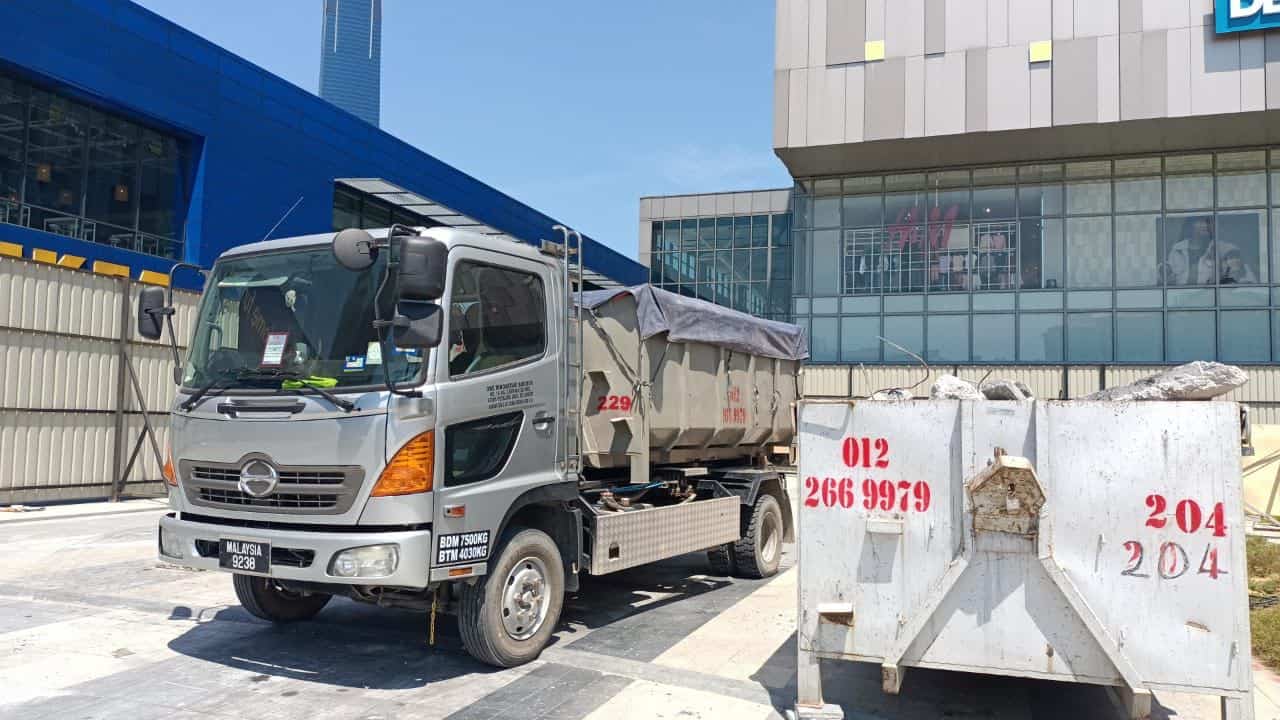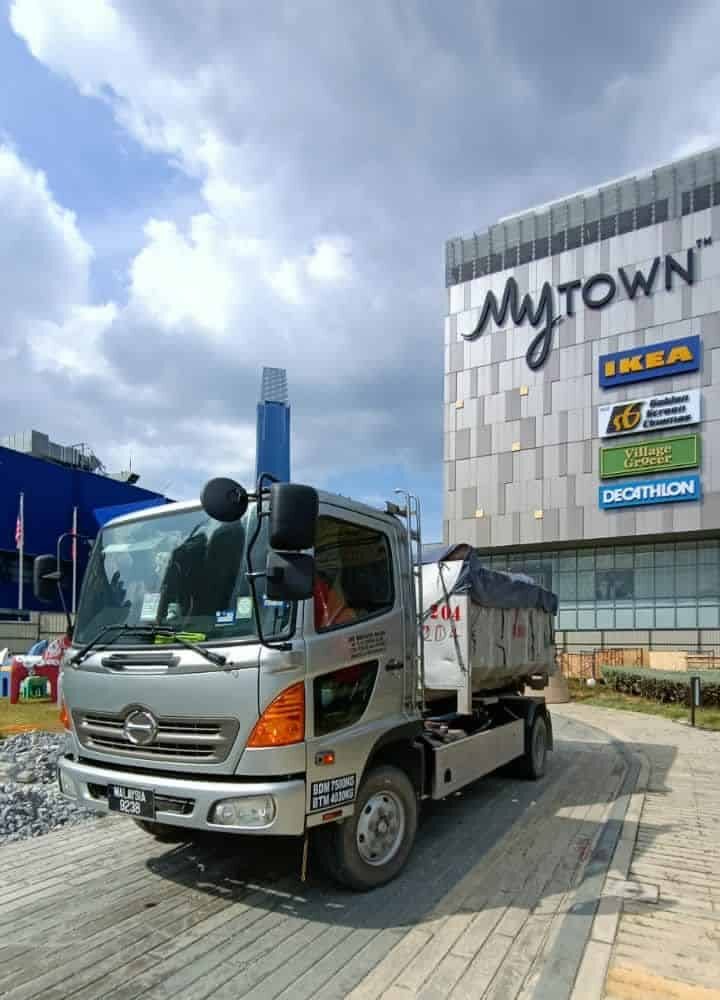RORO BIN RENTAL
Find The Right Size For Your Project

Small Roro Bin
Dimensions: 12′ (L) X 6′ (W) X 2.5′ (H)
Best Use: Heavy construction and demolition waste like concrete and soil.

Large Roro Bin
Dimensions: 12′ (L) X 6′ (W) X 4′ (H)
Best Use: Light-weight construction, industrial, commercial waste, furniture, household bulky waste, trees and etc.

Domestic Roro Bin
Dimensions: 12′ (L) X 6′ (W) X 4′ (H) with roof
Best Use: Domestic food waste (Organic waste).

Extra Giant Roro Bin
Dimensions: 16′ (L) X 8′ (W) X 6′ (H)
Best Use: Light-weight construction, industrial, commercial waste, furniture, household bulky waste, trees and etc.

Giant Roro Bin
Dimensions: 14′ (L) X 7′ (W) X 5.5′ (H)
Best Use: Light-weight construction, industrial, commercial waste, furniture, household bulky waste, trees and etc.
WHAT MAKES US DIFFERENT ?

Value Price

Express Service

Licensed Under Local Authorities

Quick Scheduling
TESTIMONIALS
OUR CLIENTS







PROJECT REFERENCE









Waste Disposal for Construction
Understanding the Importance of Waste Disposal in Construction
Proper waste disposal is vital for the construction industry, not only for maintaining a safe and clean working environment but also for minimizing environmental impacts. The industry generates tons of waste, from debris to hazardous materials, and managing this waste is essential to sustainable development.
Environmental Impact of Construction Waste
Construction projects generate large volumes of waste, which often end up in landfills or incineration facilities, both of which have adverse environmental effects. Mismanaged waste can release harmful pollutants into the air, soil, and water, causing long-term damage to ecosystems and human health.
Legal Regulations for Construction Waste Disposal
Strict regulations are in place globally to manage construction waste, as improper disposal can lead to fines and legal consequences. These laws aim to ensure that construction companies handle, transport, and dispose of waste responsibly to prevent environmental harm.
Benefits of Proper Waste Management in Construction Projects
Effective waste management can cut down disposal costs, improve resource efficiency, and help a company’s reputation by aligning with green practices. Plus, recycling and reusing materials can reduce the need for new resources, saving money and reducing environmental strain.
Types of Construction Waste
Understanding the types of waste generated in construction is essential for determining the best disposal methods.
Common Categories of Construction Waste
- Concrete and Masonry: These are often reusable in road construction or other construction projects.
- Metals: Metals like steel and aluminum are highly recyclable and can be repurposed without losing quality.
- Wood: Untreated wood can often be recycled, while treated wood may require special handling.
- Plastic and Insulation Materials: These often require careful sorting and recycling to prevent pollution.
- Hazardous Waste: Includes chemicals, paints, and asbestos, which need special disposal processes due to their toxic nature.
Challenges in Construction Waste Disposal
Disposing of construction waste comes with unique challenges that make management more complex.
High Volume and Heavyweight of Waste Materials
Construction waste is often bulky and heavy, leading to high transportation and disposal costs. It requires specialized equipment to transport and can quickly fill up landfills, contributing to environmental strain.
Hazardous and Non-Biodegradable Waste
Hazardous waste, such as asbestos and solvents, poses significant risks to human health and the environment. Non-biodegradable materials like plastic and insulation materials are also challenging to dispose of sustainably.
Limited Disposal Sites and Resources
Many construction projects are located in urban areas where disposal sites are limited, and finding sustainable disposal solutions can be challenging.
Effective Construction Waste Management Techniques
By adopting specific techniques, construction companies can better manage their waste and reduce their environmental impact.
Source Reduction Techniques
Source reduction is about minimizing waste before it’s created. This can be achieved through careful planning and using materials more efficiently, reducing the need for excess materials and waste generation.
Recycling and Reusing Construction Materials
Many construction materials, such as concrete, bricks, and metals, can be recycled.
- Concrete and Brick Recycling: These materials can be crushed and reused in road construction or as fill material.
- Metal and Wood Recycling: Metals can be melted down and repurposed, while wood can be reused in other projects or converted into wood chips for landscaping.
Sustainable Waste Disposal Methods in Construction
Environmentally friendly waste disposal is becoming increasingly essential.
Landfilling: Pros and Cons
Landfilling is the most common method but is not sustainable. It can pollute soil and groundwater and contribute to methane emissions, a potent greenhouse gas.
Incineration and Energy Recovery
Incinerating waste can reduce its volume and even generate energy. However, this method can emit pollutants, so it requires advanced filtering technologies to minimize emissions.
Composting for Organic Waste
Organic materials can sometimes be composted, turning waste into a resource for landscaping or agriculture.
Waste Disposal Regulations and Compliance for Construction Sites
Compliance with waste disposal regulations is mandatory to ensure safety and environmental preservation.
Key Regulations and Standards
Regulations vary by country, but they generally require construction companies to separate hazardous materials, use approved disposal sites, and report waste disposal methods.
Local and State-Level Compliance
Construction companies must adhere to local and state-level regulations that may include specific disposal methods, fines, and reporting requirements.
Best Practices for Construction Waste Disposal
Adopting best practices ensures waste disposal is efficient, safe, and environmentally friendly.
Pre-Project Planning for Waste Management
Planning for waste management before the project begins allows companies to anticipate disposal needs, reduce waste, and identify opportunities for recycling.
Educating Workers on Waste Handling
Training workers in waste management practices helps reduce accidental disposal errors and improves recycling rates.
Partnering with Waste Management Companies
Specialized companies can manage construction waste disposal efficiently, ensuring compliance with all legal requirements and reducing environmental impacts.
The Role of Technology in Construction Waste Management
Modern technology offers new ways to improve waste management in the construction industry.
Digital Solutions for Tracking Waste
Software applications can track waste generated on-site, helping companies monitor their waste disposal activities and identify areas for improvement.
AI and Robotics in Sorting Waste Materials
AI and robotics can automate sorting, making recycling and disposal processes faster and more accurate, reducing human error.
IoT for Monitoring and Minimizing Waste
Internet of Things (IoT) devices can monitor waste bins and alert teams when they’re full, preventing overflow and ensuring timely disposal.
Cost-Benefit Analysis of Efficient Construction Waste Disposal
Managing waste efficiently can result in significant financial benefits.
Reduced Disposal Costs Through Recycling
Recycling can cut down on disposal costs, as many recycling centers offer lower rates or even pay for recyclable materials.
Financial Incentives and Government Grants
Many governments offer grants, tax incentives, or rebates to companies that implement sustainable waste management practices, reducing overall project costs.
How Construction Companies Can Improve Waste Disposal Practices
By taking proactive steps, construction companies can better manage waste and improve sustainability.
Adopting a Circular Economy Approach
A circular economy approach minimizes waste by reusing materials as much as possible, creating a closed-loop system.
Implementing a Waste Management Policy
Formalizing a waste management policy ensures that all employees are aware of best practices and that procedures are consistently followed.
Effective waste disposal is critical in construction, as it ensures a clean, safe environment, supports sustainability, and reduces costs. By following best practices, complying with regulations, and utilizing technology, construction companies can make waste disposal a more efficient and eco-friendly process.


